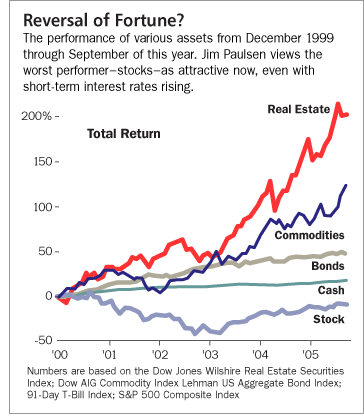| |
Southwest Over-Building, Wacky Mortgage Business and a Long-Term Perspective
(December 7, 2006)
A number of readers have sent in wonderful housing-related reports, links and comments.
First up is observant contributor John B., with a firsthand report on overbuilding in
the Southwest:
As part of tour of the Southwest we were checking for over-building. Still lots of
building every place we went. Bullhead City has developments going up everyplace. What a
God forsaken place. I really like Flagstaff and there is a lot of building there, but
there are no jobs. Who is going to buy those homes?
The most ridiculous price on a house I saw was in Mesilla, New Mexico. For those that do not
know Mesilla is next to Las Cruces, NM. Las Cruces was named about 3 years ago as one of
the top 10 places to retire to in the US. I personally like it far more than Phoenix.
Anyway, Mesilla is a very historic town that time forgot outside of Las Cruces. I saw a
little shotgun shack about a block off of the town square that had been remodeled
and they wanted $200,000 for it. We are talking about a place with no lot and about 6 inches
on each side from its next door neighbors. Probably 2 bedroom and 1 bath.
Mesilla reminds
me of one of those Mexican (it was part of Mexico for a 100 years) towns in a Western film where
a stray starving dog runs down the street right before the Magnificent Seven ride into town.
It has maybe 3 places to get something to eat, a convenience store and 2 gas stations.
I doubt that it has a supermarket. However, it is nestled against the Organ Mountains and
it is pretty. I just kind of laughed to myself and shook my head. If there is a job in
Mesilla or Las Cruces where you could make over $50,000 a year I would be surprised.
Jobs, we don't need any stinking jobs! We have options ARMS! That is a poor imitation
of "The Treasure of Sierra Madre."
Next up is a story recommended by another frequent contributor, Michael Goodfellow, on
the astonishingly loose standards of today's mortgage business. After you read this, you
will no longer wonder how the housing bubble reached such epic proportions.
The party's over at Kirkland mortgage company

Excerpts from the story: "Merit did put loan officers through a 19-step program.
"Loan Officer 101" was 15 minutes long, as was "Mortgage Glossary." Thirty minutes were
devoted to "10 Step Loan Flow."
Saulness wasn't impressed. She sat next to two 18-year-old loan officers.
"They didn't even know how to read a credit report," she said.
Barry said wryly that many "had no idea what product they were selling, but they knew how
much money they could make."
Merit employees proudly posted their résumés, plus photos of their luxury cars and drinking
parties, on various Web sites. One loan officer had come to work fresh from being a
Hooters Girl. Another solicited clients for two endeavors: writing mortgages for Merit
and selling marijuana paraphernalia on the side.
Indeed, several Merit loan officers boasted online that doing drugs was a favorite pastime.
"Let's get hopped up and make some bad decisions," wrote one beside a photo of himself
grinning broadly."
Reader Riley T. takes a long view of the housing market. I agree with his view
on long cycles. When nobody remembers a time
when housing dropped, then that complacency creates the perfect conditions for a trend
reversal: "permanent" up switches to "permanent" decline. We may be in the first stages of
just such a decline. Here are Riley's comments:

"I have listened to the horseshit concerning housing for 35 years.
It is impossible for anyone I have talked to, to imagine a time when houses will not
increase in price.
However, just for a moment imagine a scenario when houses are not going up in price and
they won't be going up in the future. Now how many people will commit to a thirty-year
mortgage they can't afford. Maybe half of the current mortgage holders?
Houses are now perceived to be a financial asset, buying a house is considered to be an
investment. A house sits out in the rain and cold and sun for 30 or 40 or 80 years and is
supposed to be worth more.
How about a time, now, where houses drop by 80 per cent over the next 10-15 years and stay
there. How much will someone making a Wal-Mart $8-$9 an hour salary be able to pay for a house?
Three times annual gross would be about $50,000, and an $8-$10 an hour job may be a good job
in the future.
Once people realize a house is not a financial asset the final wave down will begin and
its anybodys' guess how low it will go. The wave length up has been about 60-70 years,
how long will the wave length down be?"
Riley T.
Thank you, readers, for diverse and interesting comments on the housing bubble.
(Note: charts were added to illustrate points being made; they are independent of readers'
comments.)
For more on this subject and a wide array of other topics, please visit
my weblog.
copyright © 2006 Charles Hugh Smith. All rights reserved in all media.
I would be honored if you linked this wEssay to your site, or printed a copy for your own use.
|
|

